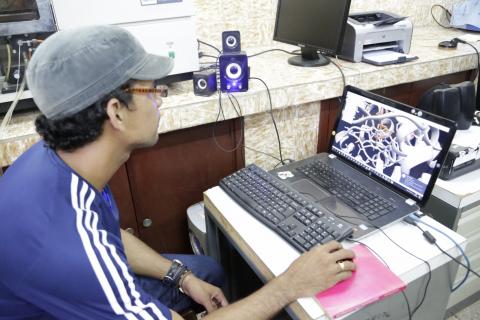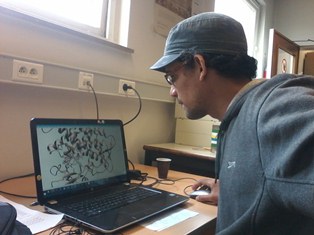
Obtained from Furfural, a byproduct of sugar cane bagasse, the young Phd. Student Julio Rojas Vargas works on the design of new antiparasitic drugs, which are essential in the current global pharmaceutical industry.
Mr. Rojas’ research, an outcome of the TP2 “Strengthening of Basic and Natural Sciences for Innovation”, is addressed to the design of drugs to fight the Trypanosoma Cruzi, responsible for the Chala disease, widely known as the most significant parasitic disease in Latin America. In the same way, he studies the Trypanosoma Brucei, which causes the Sleeping Sickness, (around 60 million of Africans have been exposed to it), and lastly, the Lesmania, a parasite that causes the Leishmaniasis, the disease which is responsible for the death of approximately 30 000 people in the world. Considered to be three out of the thirteen most neglected diseases throughout the world nowadays, these diseases mostly originally come from Latin America and Africa and show high levels of infestation.
“We attempt to design, synthetize, and study the biological activity of the drug, in order to be able to fight the parasite and, simultaneously limit its toxicity to the human body to the lesser degree. We hope to obtain the patent of this product and introduce it into the Cuban pharmaceutical industry. In the specific case of the Leishmania, we work alongside the “Pedro Kourí” Institute of Tropical Medicine from Havana,” says Mr. Rojas.
As stated by this scholar, the VLIR Project has sponsored 3 research stays in Belgium that have made possible the characterizations of the chemical compounds. “In Cuba, the compound is synthesized and purified; this way, it is ready for characterizations with certain chemical and spectroscopic techniques. At the Rega Institute, belonging to the Faculty of Pharmaceutical Sciences of the University of Leuven, I performed the mass spectrometry for the characterization and other procedures with leading-edge technology. It is necessary to highlight the fact that a part of this research, specifically some studies regarding biological activity, was conducted at the University of Antwerp. You learn a great deal, and the academic exchange which I have had access to in Belgium, has been of paramount importance for the research”.
According to Mr. Rojas, the raw material for the elaboration of these drugs is completely produced within our domestic borders. “The compounds identified, Imidazoles, are obtained from the sugar cane bagasse, from which the Furfural is extracted. From this byproduct, a family group of Imidazoles is obtained, and a family of compounds is created; within the latter, we study the biological activity. We have not specified yet whether it will be a single drug; but, for the time being, at least two compounds with non-specific action have been identified, which could be used to fight any of the three parasites studied. “
31-year-old Julio Rojas majored in Chemistry and currently teaches the subject Organic Chemistry in the Faculty of Natural and Exact Sciences of the Universidad de Oriente. His research results reach the classroom as well. “I work in the field of Theoretical Chemistry and we have such subjects as Computational Chemistry and Molecular Design in which we acquaint students with the modeling programs that have been attained in collaboration with the VLIR project.”
Four paper diplomas presented in the previous year tackled the design of compounds with antituberculous and antifungal activity, and, next month, two senior students will expose their results in terms of compounds with antiparasitic activity.
At present, Julio Rojas Vargas is embedded as well in the development of antifungal studies with the purpose of applying them in order to fight certain fungi that jeopardize the agriculture in the country.
Photos taken during the research stays in Belgium. Photo: courtesy of the interviewee.

Rojas works in the design of drugs that fight different types of fungi that affect Cuba’s current agriculture.
Photo: courtesy of the interviewee.
Translator: Lilia Sanz Gámez

